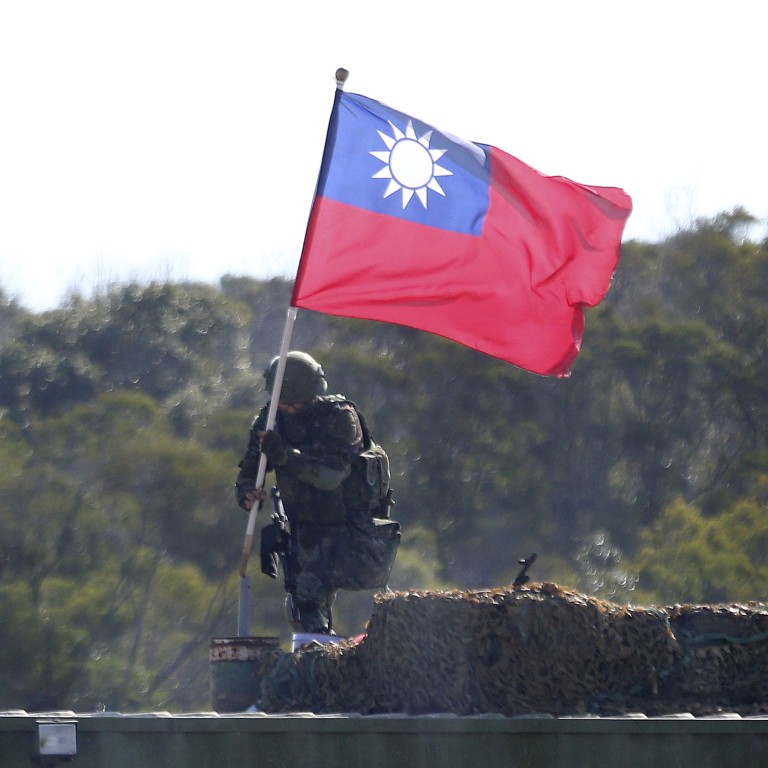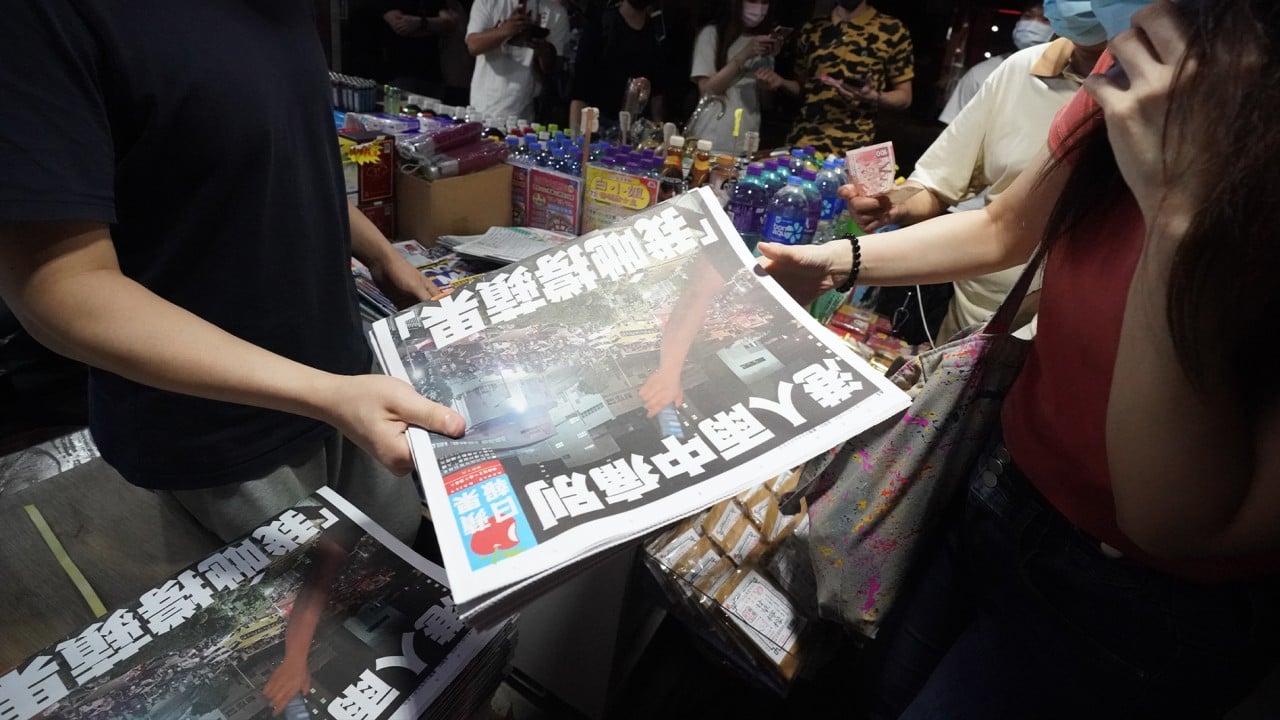
Beijing blasts Japan’s ‘sense of crisis’ over Taiwan Strait tensions
- Tokyo has released a defence white paper escalating its concerns over the stability of Taiwan, angering Beijing
- Report notes the overall military balance between Taipei and Beijing is tilting in the mainland’s favour
Chinese foreign ministry spokesman Zhao Lijian said the Japanese defence white paper released on Tuesday was full of “cold war mentality”, and called on Tokyo to respect China’s sovereignty. “China is strongly dissatisfied. Taiwan is purely China’s internal affairs,” he said. “China does not allow any country to intervene in the Taiwan issue in any way”.
Zhao said the defence paper exaggerated China’s threat and was extremely irresponsible.
Mainland China and Taiwan ‘on the brink of war’, think tank says
According to the report, Japan said it was facing heightened security risks because of China’s military advancement and the rivalry between China and the US.
“Stabilising the situation surrounding Taiwan is important for Japan’s security and the stability of the international community. Therefore, it is necessary that we pay close attention to the situation with a sense of crisis more than ever before,” the paper said.
“The overall military balance between China and Taiwan is tilting to China’s favour, and the gap appears to be growing year by year. Attention should be paid to trends such as the strengthening of Chinese and Taiwanese forces, the sale of weapons to Taiwan by the United States, and Taiwan’s own development of its main military equipment.”
Taiwan’s foreign ministry spokeswoman Joanne Ou expressed appreciation to Japan for its “high degree of concern over security in the Taiwan Strait,” saying Japan considered the island an important partner and friend, sharing the basic concepts of freedom, democracy, human rights and the rule of law, as well as close economic and personnel exchanges.
“Our government will continue to closely work with Japan and like-minded countries to firmly safeguard democratic values and international order and in joint effort to promote peace, stability and prosperity in the region,” she said.

01:50
Japan hosts military exercises with the US, France and Australia amid tension over East China Sea
Chinese diplomatic observers said Japan was raising its rhetoric on Taiwan as Washington was also moving to closer ties with the island, but Tokyo has its security concerns.
Xu Liping, an international relations professor from the Chinese Academy of Social Sciences, said Japan was concerned about Taiwan as many Japanese industries are based in the island.
“However, as China’s economic and military strength grows, it is necessary for China to make Japan realise the issue of Taiwan as the bottom line for China,” he said.
“Japan is so nervous about Taiwan because if China “unifies” Taiwan, then Japan will lose a security barrier. They will worry whether China will move [on] the Diaoyu Islands next”.
China reasserts Diaoyus claim with island survey as tensions rise with Japan
Xing Yuqing, from the National Graduate Institute for Policy Studies in Tokyo, said Japan was alert to the possibility of armed conflict in the Taiwan Strait.
“The armed conflict that may break out in the Taiwan Strait will affect Japan’s national security and even drag Japan into war,” Xing said, adding Japan would strengthen its cooperation with the US military. “The purpose of such is to weaken China’s plan to reunify Taiwan by force, so as to avoid the worst consequences caused by strategic misjudgments.”
The defence report follows last week’s remarks by Japanese deputy prime minister Taro Aso that Japan and the US would have to defend Taiwan in the event of a serious contingency – remarks which he later appeared to walk back from.
“Chinese military trends, combined with insufficient transparency about China’s defence policies and military affairs, have become a matter of grave concern to the region including Japan and the international community,” the paper said.
“It is strongly hoped that China will play active roles in the region and the international community in a more cooperative manner.”
The People’s Liberation Army sent 28 military planes close to Taiwan in June – the largest exercise this year – in response to a visit to the island by three US senators who arrived on a military plane.
The defence paper also mentioned that Chinese warships, including an aircraft carrier, sailed through the Bashi Channel, the waterway connecting the South China Sea with the western Pacific Ocean, and conducted a military drill last year.
Taiwan and mainland China have been governed separately since they split amid civil war in 1949. Beijing has since regarded Taiwan as a renegade province awaiting reunification, by force if necessary, and is dismayed by the island’s administration under Tsai Ing-wen, which it sees as a pro-independence force.
President Xi Jinping in early July vowed to crush any attempt that gets in the way of “complete reunification” of Taiwan with the mainland, describing it as “a historic mission and an unshakeable commitment” of the Communist Party.
Xi vows to crush attempts to thwart ‘complete reunification’ with Taiwan
“As the Biden administration makes clear it will support Taiwan in a military sense, it is unlikely China will compromise with the US stance, and there is a possibility that a confrontation between the US and China will emerge,” the defence paper said.
Tokyo expressed concerns over the closure of Apple Daily newspaper in Hong Kong following the arrest of its senior management including founder Jimmy Lai Chee-ying on national security grounds, triggering rebuke from Beijing.

06:28
Hong Kong tabloid Apple Daily ceases operations after top executives arrested, assets frozen
The defence paper also blamed China for “unilateral attempts to change the status quo by coercion” near the Diaoyu Islands, called the Senkakus in Japan, in the East China Sea.
It said competition between the US and China was becoming more prominent across the political, economic and military realms, with both countries making moves to keep each other in check.
“As China rapidly enhances its military power, changes in the military power balance between the United States and China may possibly affect the peace and stability of the Indo-Pacific region. It is necessary to pay greater attention to the military trends of the two countries in areas such as the South China Sea and Taiwan,” it said.
Xi vows to crush attempts to thwart ‘complete reunification’ with Taiwan
Lian Degui, a Japanese affairs expert with the Shanghai Institutes for International Studies, said Taiwan was a “bottom line” issue in China-Japan relations, and Beijing was expected to react strongly.
“The Taiwan issue depends on the attitude of the United States. If the United States does not pressure Japan to interfere in the Taiwan issue, Japan would not undermine Sino-Japanese relations because of the issue,” he said.
Additional reporting by Lawrence Chung, Kyodo, Bloomberg



